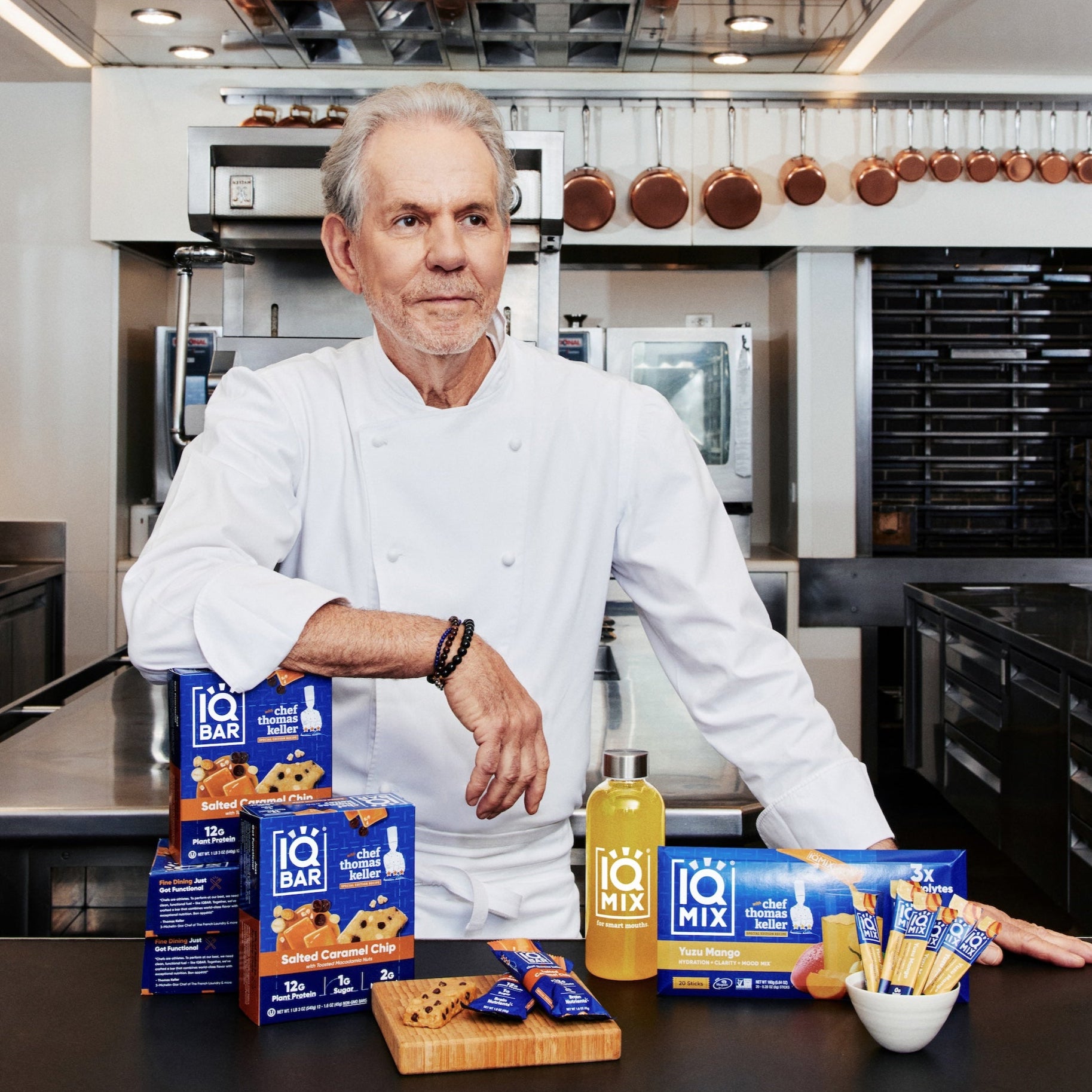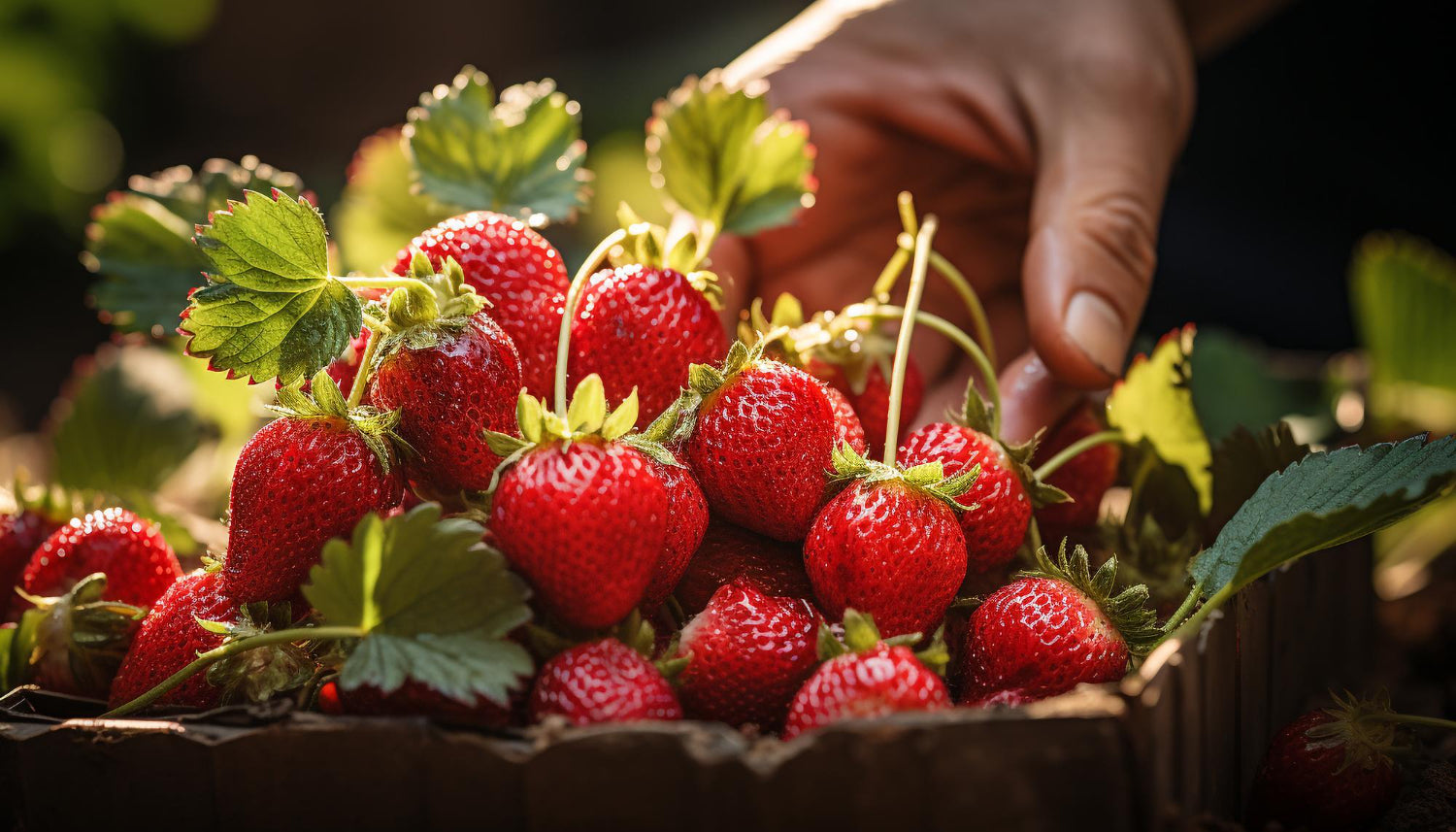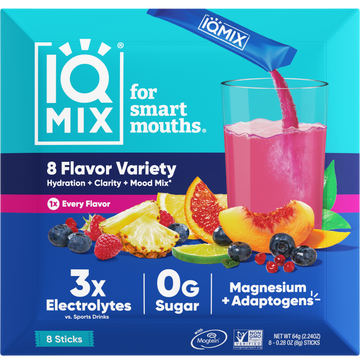Who needs superpowers from radioactive spiders when you have flavonoids? Sure, they won’t help you sling webs across the city, but they do work tirelessly to conquer health-damaging villains and make you feel invincible.
Never heard of them? These colorful crusaders are hiding in plain sight, giving fruits and veggies their vibrant hues. But they’re more than an awesome costume, as you’ll discover today.
We’re spilling the tea on how these tiny titans crack the code to longevity and where you can snag more of them.
What Are Flavonoids?
Flavonoids are a special group of polyphenols found in colorful vegetables, fruits, herbs, and other plants. These phytochemical compounds are some of the most effective antioxidants.[*][*]
Though scientists have discovered over 10,000 different flavonoids — each boasting their own unique superpowers — this squad works even better together.[*][*] Some researchers say they’re even stronger than vitamin C and vitamin E, the two most common antioxidant supplements.[*]
So, Why Are Flavonoids Like Next-Level Antioxidants?
Because they have a special chemical structure that allows them to donate electrons to free radicals, essentially neutralizing them and rendering them harmless.[*][*]
Free radicals are the nasty gremlins that damage your cells and accelerate aging. The oxidative stress they inflict creates chronic inflammation in your body, which increases your risk of obesity, type 2 diabetes, heart disease, cancer, neurodegenerative disorders, and more.
Flavonoids satisfy those hungry free radicals to prevent them from wreaking havoc on your cells, tissue, and DNA. Plus, flavonoids activate enzymes that help regenerate other antioxidants like vitamin C, creating a mean tag team![*][*]
But the best news of all? Flavonoids and their metabolites have anti-inflammatory properties. They calm the fire of inflammation, promoting healing and repair while protecting damaged cells and DNA from further mutations or destruction.[*]
7 Science-Backed Health Benefits of Flavonoids
Flavonoids possess different antioxidant strengths and target various types of free radicals. As a collective, studies show these phenolic compounds can:
1. Keep Your Heart Healthy and Happy
Cardiovascular disease is the leading cause of death worldwide.[*] But thanks to their anti-inflammatory antioxidant properties, researchers say dietary flavonoids decrease your risk of heart disease and keep your ticker in shape.[*][*]
Studies show they can:[*][*][*]
- Improve blood lipid and cholesterol profiles
- Enhance blood flow and blood vessel/vascular health
- Lower blood pressure (even in people with high blood pressure)
- Prevent harmful blood clots
- Reduce the risk of stroke
All those perks may explain why people who eat more flavonoids have an 18% lower risk of dying from cardiovascular diseases.[*][*]
2. Stave Off or Reverse Type 2 Diabetes
Multiple studies highlight flavonoids’ ability to lower blood sugar levels, increase insulin sensitivity, decrease insulin resistance, and improve how your body uses glucose.[*][*] These wins may allow you to prevent type 2 diabetes and potentially reverse it.[*]
3. Enhance Your Immune System
Several flavonoids boost our immunity and pack antiviral capabilities that protect us from harmful pathogens like the flu virus. They may even empower us to overcome antibiotic-resistant superbugs.[*][*]
4. Support Cancer Prevention
Dietary polyphenols have been well-studied for their anticancer effects.[*] As polyphenolic compounds, flavonoids also fall under this umbrella. Many population-based studies demonstrate that a higher dietary intake of flavonoids correlates with lower risks of cancer.[*]
Research also shows flavonoids may prevent and slow the growth/spread of cancer cells.[*][*] They’ve also been seen to activate signaling pathways that lead to apoptosis (death) of cancer cells.[*]
5. Boost Mental Health
Anxiety and depression affect up to 20% of the world's population.[*] Evidence suggests that flavonoids may be beneficial for combatting mental health woes without any unpleasant side effects.[*]
In a meta-analysis of 36 clinical trials, higher flavonoid intakes significantly improved symptoms of depression.[*] Flavonoids have also demonstrated short- and long-term improvements in mood, anxiety, and overall well-being in children, adolescents, adults, and postnatal mothers.[*][*]
6. Raise Your Cognitive Performance
Flavonoids have been shown to cross the blood-brain barrier, which is probably why people often feel “sharp” after eating colorful fruits and vegetables.[*]
These bioactive compounds promote neurogenesis (the growth of new brain cells), strengthen synaptic connections, activate new inter-neuron signaling pathways, and encourage synaptic plasticity.[*][*][*] This occurs in key learning and memory-related brain regions like the hippocampus.[*]
Better connectivity in this part of your noggin explains why studies show flavonoids improve executive function, processing speed, working memory and long-term memory, and mental stamina.[*][*][*]
Flavonoids may also preserve your cognitive prowess. In one study, participants with the highest flavonoid intake scored significantly better on mental performance tests at baseline and after 10 years of follow-up than those who ate the least.[*]
7. Prevent Neurodegeneration
Dementia, Alzheimer’s disease (AD), Parkinson’s (PD), and other neurodegenerative diseases are estimated to affect 155 million people by 2050, making it one of the most pressing issues facing human health.[*]
Luckily, diets containing flavonoid-rich foods may offer protective effects for our brains.[*][*] Several studies correlate higher dietary flavonoids with better cognitive health and reduced risks of cognitive impairment, AD, and PD.[*][*][*][*][*] Their antioxidant activity may play a role in the inhibition of these diseases and counteract progression, providing a potential treatment route too.[*]
According to research on the effects of flavonoids, they may:[*][*][*][*][*]
- Shield neurons from oxidative stress and neuroinflammation
- Prevent neuron degeneration
- Protect cells in the hippocampus (a hub for learning and memory)
- Reduce dopamine decline and amyloid protein production
- Encourage the growth of new brain cells (to replace damaged ones)
- Preserve cognitive performance with aging
Consider this: In one study of older adults without cognitive impairment, those with the lowest flavonoid intakes had a 50% higher risk of developing dementia over the next five years than those with the highest.[*]
So, now that you know all the benefits of flavonoids, let’s talk about the best food sources.
Where To Find Flavonoids In Foods
Scientists have grouped those 10k+ flavonoids into 12 major subclasses. Of that list, these six types of flavonoids are the most widespread in our diet:[*]
Anthocyanidins
You'll rarely find anthocyanidins by themselves in nature. They’re more like the crew that works behind the scenes to support anthocyanins, the real stars of the show. These give foods their signature red, purple, and blue pigments.
You’ll find anthocyanins in:
- Berries (cranberries, currants, raspberries, blueberries, blackberries, elderberries, and strawberries)
- Grapes and red wine
- Veggies like red cabbage and purple potatoes
Flavanols (Also Referred To As Flavan-3-ols)
After anthocyanins, the flavanols subclass reigns as one of the most well-studied flavonoid groups. It includes catechins, epicatechins, and epigallocatechin gallate (EGCG).[*] You can think of them as close cousins, sharing similar features but with their own distinct personalities and health benefits.
You’ll find flavanols in:
- Black tea, green tea, white tea, and oolong tea
- Cocoa and dark chocolate
- Fruit such as apples and pears
Flavonols
Flavonols occur abundantly in nature. The most scientifically studied flavonols include kaempferol, quercetin, rutin, and myricetin.[*]
You’ll find flavonols in:
- Veggies such as onions, scallions, cucumbers, spinach, squash, peppers, and green beans
- Cruciferous veggies such as Brussels sprouts, broccoli, kale, arugula, and watercress
- Apples, berries, and tomatoes
- Green and black tea
Flavones
The flavones subgroup includes flavonoids such as apigenin and luteolin.[*]
You’ll find flavones in:
- Veggies such as celery, carrots, broccoli, spinach, kale, peppers, and garlic
- Herbs such as parsley, thyme, oregano, rosemary, and peppermint
- Chamomile tea
- Natural brain health supplements like ginkgo biloba and St. John’s Wort
Flavanones
Flavanones include flavonoids such as hesperidin and naringin.[*] They add bitterness to foods and drinks.
You’ll find flavanones in:
- Citrus fruit (oranges, grapefruits, lemons, limes, tangerines, etc.)
- Citrus juice and peels
- Hops
Isoflavonoids
Isoflavonoids are a large, distinctive, and somewhat rare subgroup of flavonoids. Isoflavones are the most well-known and studied constituents of this family.
You’ll find isoflavones in:
- Soybeans and soy-based products
- Legumes (lentils, peas, chickpeas, peanuts, and beans)
Ready To Add More Flavonoids To Your Diet?
Experts recommend including as many flavonoids in your diet as you can.[*] Though many are present in raw foods, cooking can increase their bioavailability, making their flavonoid content easier for your body to absorb.
The best way to reap the benefits of flavonoids is to eat a rainbow of whole, unprocessed non-GMO foods and natural products. You can even combine lots of flavonoid-rich foods in salads, smoothies, stir-fries, and more. They have such low toxicity levels, you can’t go overboard here.
Get Your Flavonoids On the Go with IQBARS ✨
We get it; the average American doesn’t have time to check off all these flavonoids during meal prep or eat the rainbow when they’re on the go. But time shouldn’t be an inhibitor of better health.
That’s why IQBARs are your lucky pot of gold. Our ultra-clean label protein bars are packed with plant-based protein, brain nutrients, and flavonoids like cocoa, unsweetened chocolate, legumes, lemons, wild blueberries, matcha, and more!
You can unleash the flavonoid force anywhere and make these colorful champions your everyday allies.
🌈 Find your favorite IQBAR flavor with the 7-Bar Sampler! It includes 1 bar of all 7 of our flavors. No risk, no commitment — just a flavonoid fiesta.
Written by Lauren Ciccarelli, a writer and research geek passionate about low-carb nutrition, mental health, and meditation. Her 2,500+ articles empower doers with science-backed tips for leveled-up living.




